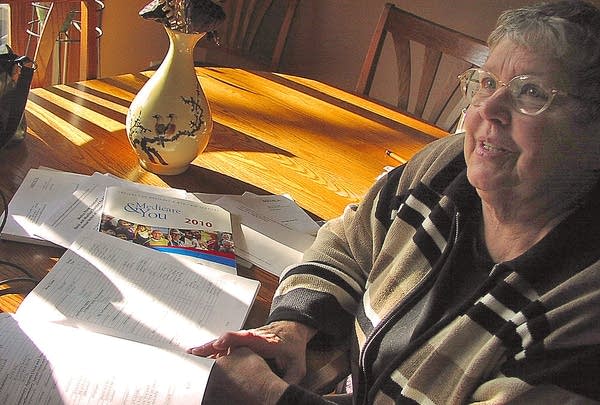Seniors will see $250 checks to cover Medicare Part D gap
Go Deeper.
Create an account or log in to save stories.
Like this?
Thanks for liking this story! We have added it to a list of your favorite stories.

Beginning this fall, some senior citizens will start getting $250 checks as a result of the new federal health care law.
The rebate will go to seniors who are enrolled in Medicare's Part D prescription drug plan and have hit the coverage gap known as the "doughnut hole."
The doughnut hole is a comfy name for what's actually a fearful situation for seniors who depend on Medicare to help them pay for their prescription drugs.
This year, Part D covers the first $2,830 in drug costs, but then seniors in the program must pay the full amount of their drugs until he or she spends another $4,550 and the coverage kicks back in.
Turn Up Your Support
MPR News helps you turn down the noise and build shared understanding. Turn up your support for this public resource and keep trusted journalism accessible to all.
Last November, when Congress was debating reform, MPR News talked with 66-year-old Sally Burns of Eden Prairie. Burns had just hit the gap and was was stunned when one of her medication's $35 copay turned into $273. She ended up paying about $1,000 after she hit the gap.
Five months later, Burns is in a new year of coverage but needs the same medicines for her breathing problems.
"It's really only two but they're about $500 month together combined," she said. "So I'm quite certain I'll be in the doughnut hole before the year's over."
Recently on an online chat, the deputy administrator for the Centers for Medicare and Medicaid spoke to seniors about the new federal law's effect on closing the doughnut hole.
Marilyn Tavenner said beginning this year, seniors that hit the coverage gap will get a $250 rebate check to help them cover the cost of their drugs.
"That will be something that comes automatically," Tavenner said. "There's no need to contact us. You should not be contacted by outside vendors. This will be a straight contact between [the Centers for Medicare and Medicaid] and the individual receiving the check."
For Sally Burns, that rebate will help, especially if she ends up in the doughnut hole and it costs her another $1,000.
Kaiser Foundation analyst Juliette Cubanski said even bigger changes will come in 2011.
"People who reach the coverage gap will automatically receive a 50 percent discount off of the brand name prescriptions that they fill in the coverage gap," Cubanski said. "For instance, if a person is taking a brand like Lipitor, they would get 50 percent off of that prescription at the pharmacy counter."
If Burns is still on the same drugs in 2011 as she is now and they stay the same price, she'll get more help if she reaches the doughnut hole. Her two brand name prescriptions will cost her $250 instead of $500 per month.
Cubanski says seniors in the gap will also get a 7 percent discount on their generic drugs beginning next year. Over the next decade, the gap will get smaller until it's expected to close in 2020. By then, Burns will be in her mid 70s.
She is keenly aware that many people strongly oppose the law and view it as putting the nation in financial peril during a tough economy. Those sentiments frustrate her. She said she paid into private insurance plans for years and never needed prescription drugs. She said the young and the elderly are the most vulnerable in society, and the U.S. should help its own.
"When there's a disaster any place in the world, Americans jump on board and to support the people in Haiti and I gave what I could, too," she said. "I felt really badly for them. But when it's people in our own country who are suffering or not getting adequate medical care, then our politicians say, 'Well it just costs too much,' and that's really outrageous."
The process of getting the $250 rebate check begins in June but officials say seniors shouldn't expect that check until about three months after they hit the doughnut hole this year.




